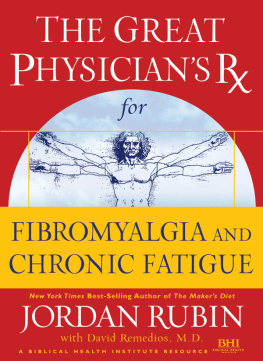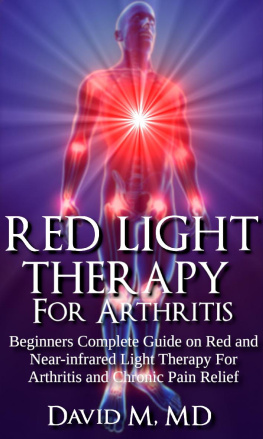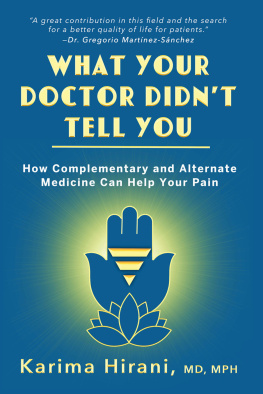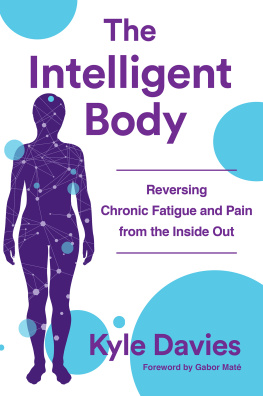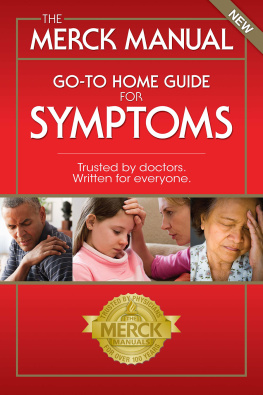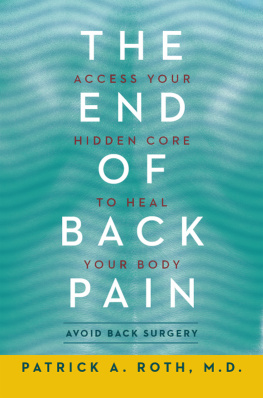

This material has been written and published for educational purposes to enhance ones knowledge and ability to improve physical health and emotional and psychological well-being. The content of the book is the sole expression and opinion of the authors. The information given herein is not intended for the diagnosis of any medical condition, and the techniques presented here are not intended to be a substitute for an individuals prescribed medications or therapies.
Copyright 2017 by Chris Gilbert, MD, PhD, and Eric Haseltine, PhD
All rights reserved. Published in the United States of America. No part of this book may be reproduced or transmitted in any form or by any means, graphic, electronic, or mechanical, including photocopying, recording, taping, or by any information storage or retrieval system, without the permission in writing from the publisher.
This edition published by SelectBooks, Inc.
For information address SelectBooks, Inc., New York, New York.
First Edition
ISBN 978-1-59079-457-9
Library of Congress Cataloging-in-Publication Data
Names: Gilbert, Chris, [date]- author. | Haseltine, Eric, author.
Title: The listening cure: healing secrets of an unconventional doctor / by Chris Gilbert, MD, PhD, with Eric Haseltine, PhD.
Description: First edition. | New York: SelectBooks, Inc., [2017]
Identifiers: LCCN 2017012069
Subjects: LCSH: Mind and body therapies. | Mind and body.
Classification: LCC RC489.M53 G55 2017 | DDC 616.89/14--dc23 LC record available at https://lccn.loc.gov/2017012069
Interior Design by Pauline Neuwirth, Neuwirth & Associates, Inc.
10 9 8 7 6 5 4 3 2 1
Listen to your body! It talks to you through cravings, pleasures, orgasms, aches and pains, and many more ways. Give it a voice, and youll understand its needs, likes, and dislikes. This is key to a healthy, balanced, and happy life.
Chris Elisabeth Gilbert, MD, PhD
ADVANCE PRAISE FOR
The Listening Cure
A truly remarkable book with riveting and powerful stories. Real healing involves more than pills and surgery. Dr. Chris Gilbert with her compassion and masterful insights uncovers the root cause of seemingly inexplicable and mystifying symptoms of many illnesses. She teaches us how to have our patients discover the hidden cause of what ails them, address it and realize spectacular and long-lasting benefits. This book is a must-read.
SANJIV CHOPRA, MD, MACP
Professor of Medicine Harvard Medical School Best-selling author of many books, including
The Big Five: Five Simple Things You Can Do to Live a Longer, Healthier Life and Live Better, Live Longer
Motivational Speaker
Useful advice from an unconventional physician and a knowledgeable neuroscientist, a brilliant pair who provide insight into emotions and effects of stress that trigger physical illness. The uniqueness of this book is that Dr. Gilbert provides the medical diagnosis, and Dr. Haseltine provides explanation based on fundamental neuroscience. A splendid combination!
DR. RITA COLWELL
Former President of the American Association for the Advancement of Science. Distinguished University Professor at The University of Maryland and Johns Hopkins Bloomberg School of Public Health
Dr. Chris Gilbert and neuroscientist Eric Haseltine have produced a book full of canny insights into the importance of stress as a cause of disease, which is both useful and intriguing.
NORMAN E. ROSENTHAL, MD
Clinical Professor of Psychiatry at Georgetown University School of Medicine
Author of Super Mind (Tarcher Perigree 2016)
If you want to understand what Mind/Body medicine really is, then read The Listening Cure. This is a curiously terrific book. It draws you in and doesnt let you go.
MARK SMITH, MD
Chief Innovation Officer of MedStar Health
NOTE TO READERS
The Listening Cure is based on the professional experiences of Dr. Chris Gilbert in treating patients in her own medical practice, and the experiences of Dr. Eric Haseltine in treating patients in his own therapy practice. The book is told from Dr. Gilberts point of view. However, no real patients (or their friends and families) are named or depicted in the book. All such names and other identifying details are fictitious, and all patients and case histories depicted in the book are composites based on the experiences of multiple individuals. The conversations between the authors and the composite patients are inspired by real conversations but have been composed for use in this book. For these reasons, any similarity between the patients and case histories in this book and any real individuals is strictly coincidental.
Throughout this book, you will find examples of patient experiences that are typical to those of real patients whom Dr. Gilbert and Dr. Haseltine have treated. The authors are sharing these examples to expand the thinking and enhance the knowledge of the reader with the goal of improving physical health and psychological well-being. But it is important for you to keep in mind that no book can take the place of a consultation between a patient and his or her physician, therapist, or other appropriate healthcare professional, and this book is not intended to do so. Each person will have his or her own unique physical and mental health issues, and some of the information and advice in this book may not be appropriate for a particular reader.
The authors have made every effort to present information that they believed to be accurate and complete at the time of publication. However, you should satisfy yourself that the information is up-to-date by consulting the professionals who are responsible for your health care.
For all of the reasons discussed above, this book is not intended to assist the reader in diagnosing or treating any medical or psychological condition, and does not create a physician-patient or therapist-patient relationship between you and either of the authors. You should consult your physician, therapist, or other appropriate health-care professional before relying on or using any of the content of this book (or any other book).
CHRIS GILBERT, MD, PHD, and ERIC HASELTINE, PHD
CHAPTER 1: SCREAM, CRY, AND LAUGH YOUR WAY TO HEALTH
3 : Cummings, N.A. and VandenBos, G.R., The Twenty Years Kaiser-Permanente Experience with Psychotherapy and Medical Utilization: Implications for National Health Policy and National Health Insurance. Health Policy Q. 1981 (2):159175.
http://www.drweil.com/drw/u/ART00694/Stress.html.
9 : Locke, J., and Fehr, F., Subvocalization of Heard or Seen Words Prior to Spoken or Written Recall, The American Journal of Psychology, 8(1) 1972, 6368.
Aarons, L., Subvocalization: Aural and Emg Feedback in Reading, first published in 1971 Perceptual and Motor Skills, 33(1), 271306.
9 .
10 .
http://www.science20.com/news/writing_down_feelings_really_does_make_us_feel_better_study_says.
CHAPTER 2: THE HEALING SECRETS THAT CHANGED MY LIFE
20 : Nevis, E., Introduction, in Gestalt Therapy: Perspectives and Applications Edwin Nevis (ed.). (Cambridge, MA: Gestalt Press, 2000) p. 3.
Mackewn, J., 1997




